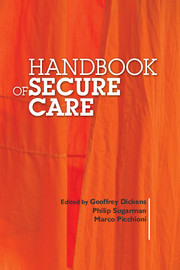Book contents
- Frontmatter
- Contents
- List of tables, boxes and figures
- List of contributors
- Preface
- 1 The evolution of secure and forensic mental healthcare
- 2 Mental disorder and offending
- 3 Clinical risk assessment in secure care
- 4 Risk management in secure care
- 5 Recovery in secure environments
- 6 Personality disorder
- 7 Women's mental health, aggression and offending
- 8 Offenders with intellectual disability in secure services and the criminal justice system
- 9 Secure mental healthcare for young people
- 10 Secure care for people with autism spectrum disorder
- 11 Acquired brain injury, trauma and aggression
- 12 Managing aggression and violence in older people
- 13 Firesetting in secure settings: theory, treatment and management
- 14 Specialist psychological treatment programmes in secure mental healthcare
- 15 Nursing in secure mental healthcare settings
- 16 Prescribing for specialist populations
- 17 Human rights in secure psychiatric care
- 18 Quality assurance and clinical audit in secure psychiatric care
- 19 Psychological support following violent assault and trauma: what works for staff in secure settings?
- Index
9 - Secure mental healthcare for young people
Published online by Cambridge University Press: 02 January 2018
- Frontmatter
- Contents
- List of tables, boxes and figures
- List of contributors
- Preface
- 1 The evolution of secure and forensic mental healthcare
- 2 Mental disorder and offending
- 3 Clinical risk assessment in secure care
- 4 Risk management in secure care
- 5 Recovery in secure environments
- 6 Personality disorder
- 7 Women's mental health, aggression and offending
- 8 Offenders with intellectual disability in secure services and the criminal justice system
- 9 Secure mental healthcare for young people
- 10 Secure care for people with autism spectrum disorder
- 11 Acquired brain injury, trauma and aggression
- 12 Managing aggression and violence in older people
- 13 Firesetting in secure settings: theory, treatment and management
- 14 Specialist psychological treatment programmes in secure mental healthcare
- 15 Nursing in secure mental healthcare settings
- 16 Prescribing for specialist populations
- 17 Human rights in secure psychiatric care
- 18 Quality assurance and clinical audit in secure psychiatric care
- 19 Psychological support following violent assault and trauma: what works for staff in secure settings?
- Index
Summary
Introduction
Mentally disordered young offenders are a complex group in whom multiple comorbidities, elements of social and educational disability, high rates of physical health problems and frequent drug and alcohol problems are present. The risk factors associated with both offending behaviour and mental disorder in young people are well established and include social disadvantage, parental loss, broken homes, poverty, abusive and neglectful experiences and abandonment (Junger-Tas, 1994; Kazdin, 1995; Rutter & Smith, 1995; Rutter et al, 1998; Rutter, 2000). Management challenges for mental health professionals include the highly nomadic lifestyle of the young person and his or her family, poor previous experiences with mental health and social services and subsequent resistance to support, complex comorbid psychopathology and a lack of community resources to aid reintegration following an in-patient admission. In recent years both the ‘Bradley report’ (Department of Health, 2009) and the Breaking the Cycle report (Ministry of Justice, 2010) have placed an emphasis on diversion from custody and early treatment of mental disorder in young offenders. The National Service Framework for Children (Department of Health, 2004) has also been influential in increasing early intervention for mentally disordered young offenders and diverting them from young offender institutions. This chapter explores the background context to these objectives and the role played by secure in-patient mental health services for young people. Initially, we focus on the prevalence of mental disorder in young offenders and the available specialist treatment resources in England and Wales. There follows a description of the secure provision for young people and the management challenges associated with this group, the available models of care and specific elements of treatment packages. The chapter concludes with a discussion of the management of transitions for young people to their next placement following a period of secure care.
The chapter focuses largely on mentally disordered young offenders. However, secure mental health services do manage other groups of young people to be deemed at high risk of harm to themselves (for instance, through self-harming or suicidal behaviour) or others, who have not been diverted from the criminal justice system. The chapter content is also relevant to these groups and we therefore use the term secure child and adolescent mental health services (‘secure CAMHS’) rather than ‘forensic services’ to refer to the range of provision.
- Type
- Chapter
- Information
- Handbook of Secure Care , pp. 131 - 147Publisher: Royal College of PsychiatristsPrint publication year: 2015



